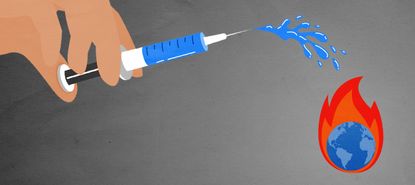Don't look now, but vaccines might just end the pandemic
The latest news gives Americans good reason for optimism


The United States has turned in arguably the worst pandemic containment performance of any rich country in the world. A few others have higher death rates, but the higher density and older populations of Belgium and Italy made them more inherently vulnerable — and even extremely poor performers like the U.K. are at least trying to maintain some kind of lockdown while the vaccine is being rolled out. Nothing like that is on the agenda here. Indeed, America never actually locked down at all by any reasonable standard.
But to my considerable surprise, the actual delivery of vaccines is going rather well in the U.S. At time of writing, about 7 percent of the population had gotten at least one shot, and the rate of inoculation has been steadily accelerating for weeks. Among larger nations, only the U.K. is doing better.
Then this week new data was published from Johnson & Johnson and Novavax showing their vaccines are quite effective — not as good as the previously approved Moderna or BioNTech/Pfizer varieties, but able to be stored in a normal refrigerator (instead of the ultra-cold freezers needed for the other two). The companies are expected to apply for emergency use authorization soon, and should get approval from the FDA a few weeks after that. If the U.S. can keep on this current path, by around this summer most of us might just be able to get back to something like normal life.
Subscribe to The Week
Escape your echo chamber. Get the facts behind the news, plus analysis from multiple perspectives.

Sign up for The Week's Free Newsletters
From our morning news briefing to a weekly Good News Newsletter, get the best of The Week delivered directly to your inbox.
From our morning news briefing to a weekly Good News Newsletter, get the best of The Week delivered directly to your inbox.
It's important to be clear that even though these new vaccines are not as great as the near-magical mRNA vaccines, which were found to be 95 percent effective at preventing illness (though this data came before new variants were discovered), their trial results are still quite strong. As Ed Cara writes at Gizmodo, the Johnson & Johnson shot was 72 percent effective at preventing moderate to severe cases of COVID-19 in the U.S., but only 57 percent effective in South Africa where the B.1.351 variant predominates. Meanwhile, the Novavax shot was 89 percent effective in the U.K., where the B.1.1.7 variant is now common, but just 60 percent effective in South Africa.
For a vaccine, these are not bad numbers. But better still, the Johnson & Johnson shot is only one dose, and was found to be 100 percent effective at reducing hospitalization and death over 28 days, even in South Africa. As someone who does not want to be hospitalized and die, I say that's good!
To be fair, the Trump administration deserves some credit for the batch of positive news. As part of Operation Warp Speed, they spent billions in contracts to buy hundreds of millions of doses, and set up a rudimentary system to get vaccines to states. Parts of this are not working well at all — the Trump crew set up a partnership scheme with CVS and Walgreens to vaccinate nursing homes that has been plagued with delays, and previous HHS chief Alex Azar bizarrely lied to states about having a reserve of doses that he had already given out, causing chaos in states that had been counting on those extra shots. Many states have also jammed up the process, either through incompetence or apathy (Kansas and Alabama), meddling politicians micromanaging everything (New York), or over-complicated distribution rules (California).
But on the other hand, some surprising states have done exceptionally well — West Virginia, for instance, opted out of the CVS/Walgreens plan, set up its own centrally-controlled system using local pharmacies and its National Guard, and is leading all other states in completed vaccinations. North Dakota has no chain pharmacies at all, and it turns out its independently owned ones are much better at getting vaccines out than oligopolist behemoths. And even the worst-performing state, Alabama, has still given 5 percent of its population at least one shot.
It simply isn't that hard to get shots in arms — and now that the president is actually trying to help instead of watching TV and tweeting, many of the problems with the federal program are being ironed out.
The Biden administration and state governments should be able to drastically increase the rate of vaccination over the coming months. This week we have averaged about 1.25 million shots per day; at that rate it would probably take until 2022 to reach universal coverage. But that's already roughly double the rate of two weeks ago, and given that the government is reportedly near to an agreement to get an additional 200 million doses of the Moderna and BioNTech/Pfizer vaccines (bringing the total for them to 600 million), and Johnson & Johnson has promised to deliver another 100 million by the end of June, fairly soon most places will be able to forget about qualification requirements and simply vaccinate everyone as fast as possible. Three or even five million shots a day should be achievable. (Those figures mean the U.S. is sure to have extra doses; these should be given away to poor countries.)
Now, at some point we will run into the problem of people being unable or unwilling to get the vaccine. It will be a good idea to set up free clinics in impoverished or isolated locations, and it may be necessary to require people to be vaccinated before their children can go to school, or before they can return to work. But quite soon even young, healthy people will be able to get their shot, the fear of you or your loved ones facing a horrible death will ease up, and as cases keep falling, Americans will be able to carefully return to normal life.
Sign up for Today's Best Articles in your inbox
A free daily email with the biggest news stories of the day – and the best features from TheWeek.com
Ryan Cooper is a national correspondent at TheWeek.com. His work has appeared in the Washington Monthly, The New Republic, and the Washington Post.
-
 Why is Putin 'de-exonerating' Stalin's victims?
Why is Putin 'de-exonerating' Stalin's victims?Under the radar Russian president has 'insatiable impulse' to 'rewrite history', say commentators
By Chas Newkey-Burden, The Week UK Published
-
 Shahnaz Habib's 6 favorite books that explore different cultures
Shahnaz Habib's 6 favorite books that explore different culturesFeature The essayist and translator recommends works by Vivek Shanbhag, Adania Shibli, and more
By The Week US Published
-
 'Why is the expansion of individual autonomy necessarily always good?'
'Why is the expansion of individual autonomy necessarily always good?'Instant Opinion Opinion, comment and editorials of the day
By Justin Klawans, The Week US Published